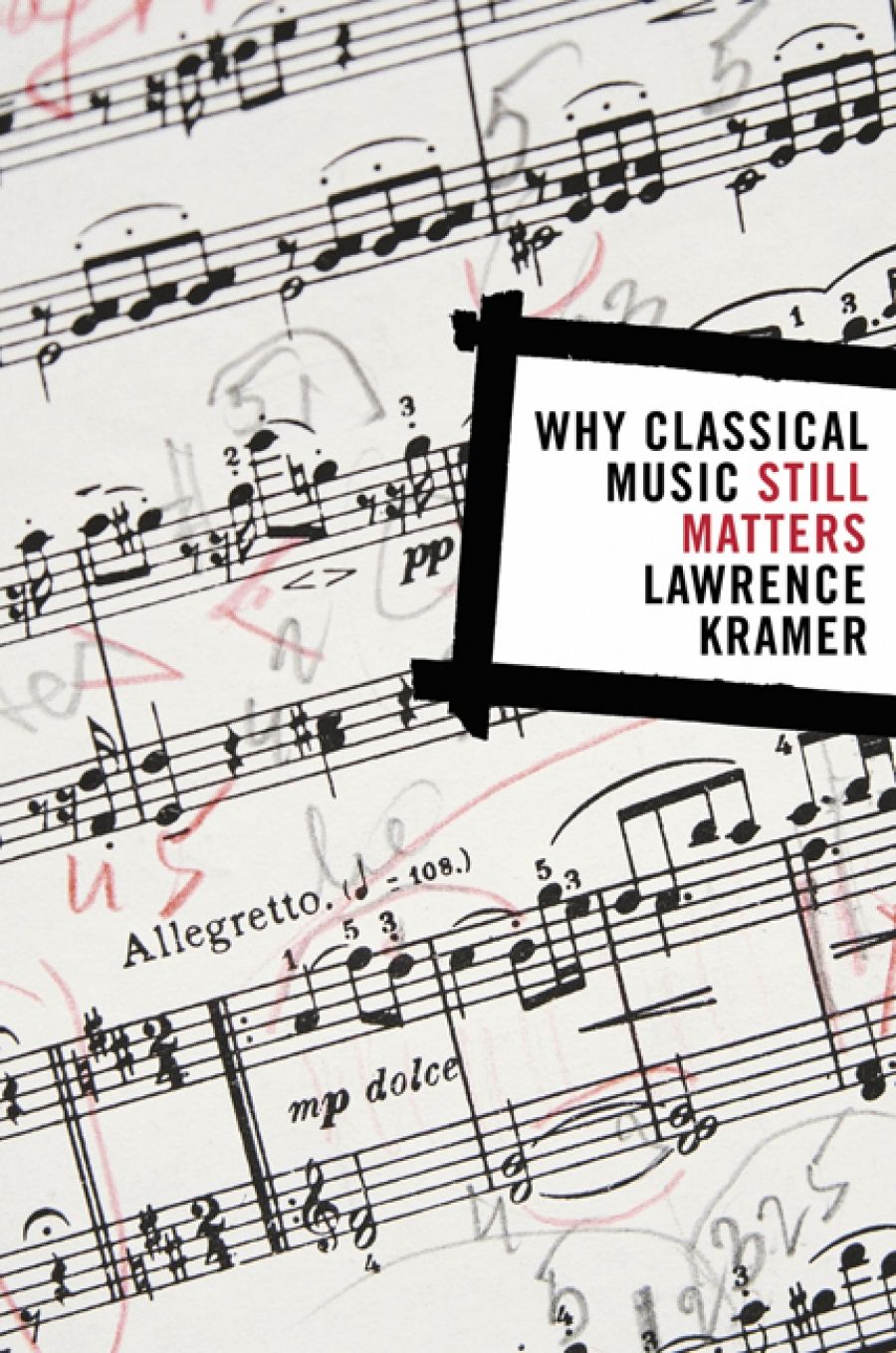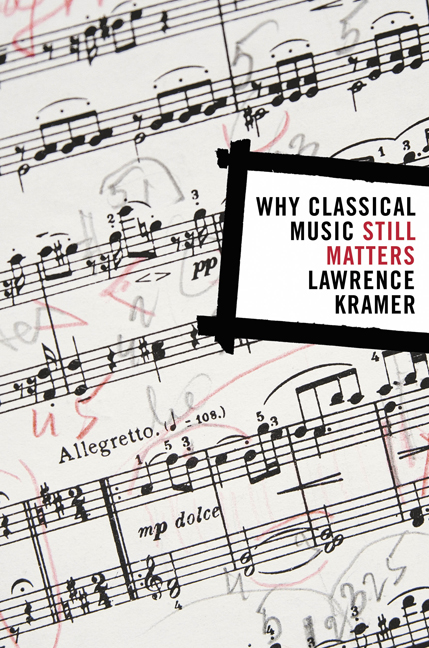
- Free Article: No
- Contents Category: Music
- Review Article: Yes
- Article Title: Far From Done With
- Online Only: No
- Custom Highlight Text:
A little over a year ago, the contents of George W Bush’s iPod were made public. The revelation offered momentary respite to the beleaguered president as the international press seized upon the playlist, scrutinised its contents and, much to the relief of the White House, made tallies of song titles and popular music genres instead of the latest casualties in Iraq. IPod One, as it was dubbed, was shown to be heavy on country and western music and 1970s rock, and light on just about everything else. ‘No black artists, no gay artists, no world music, only one woman, no genre less than 25 years old, and no Beatles,’ reported the London Times.
- Book 1 Title: Why Classical Music Still Matters
- Book 1 Biblio: University of California Press $49.95 hb, 256 pp
- Book 1 Cover Small (400 x 600):

- Book 1 Cover (800 x 1200):

It came as no surprise to learn that iPod One was utterly bereft of classical music, but what surprised me was that the lack of classical music on the presidential iPod was not deemed newsworthy by those who covered the story. President Bush was gently ridiculed for his unsophisticated taste in popular music, but the fact that he obviously never listens to classical music passed without comment. Classical music wasn’t just absent from the iPod, it was absent from the discussion. Is classical music really so far on the margins of the consciousness of most people nowadays that not a single journalist happened to notice the presidential snub?
ln his preliminary remarks in this absorbing book, Lawrence Kramer states that classical music plays little or no part in the lives of an increasingly large number of culturally sophisticated people. These same people would doubtless consider their lives much the poorer were they not able to exercise their interests in literature, theatre, cinema and visual art, yet seem to have no qualms about being ‘classical-music illiterates’. But as Kramer rightly points out, part of the problem has been the unfortunate tradition of classical music’s ‘defenders’ insisting upon the superiority of their music and suggesting that, in order to ‘understand’ it, listeners need to acquire technical know-how and jargon. Many of classical music’s advocates have thus reinforced perceptions of snobbery and inaccessibility that have hindered widespread appreciation of it in the first place. To my mind, we still encounter these attitudes in radio programmes that seek to demonstrate the intrinsic worth of a particular musical work by analysing its structural properties, and in unctuous concert programme notes that take for granted the cultural greatness and value of the works being performed. What if you can’t hear the underlying structure? What if the work doesn’t sound so ‘great’ to your ears? Are you somehow not ‘getting it’? Are you a classical-music illiterate not by choice but by predestination?
Kramer stresses that classical music is accessible to all who are willing to listen to it attentively. Technical expertise is not required, nor is a knowledge of musical terminology. ‘Musical meaning does not depend upon being decoded,’ he writes, ‘it depends upon being lived.’ In other words, listening to a piece of classical music should be a dynamic experience. In order for the music to engage us, we have to engage with it. ‘Meaning’ emerges from the interaction between the sounds set in motion and the attentive ears and imaginative mind that journey with them:
Musical meaning comes about when a spark leaps up between some musical detail and an idea or image, a metaphor or tum of phrase, a movement or a gesture, a perception or a memory. It does not matter whether this process starts or ends with the music, whether it occurs when we respond to the music we hear or when we respond with music to some other thing. Either way, we bring the music close to some worldly circumstance in the faith that the closeness is something recognized, not something concocted.
If all this sounds distressingly subjective, Kramer’s response is that classical music is fundamentally bound up with human subjectivity and that this is precisely what brings immediacy and potency to the experience of classical music. It is no surprise, he argues, that classical music emerged in the eighteenth century, for it is imbued with the Enlightenment’s ‘discovery’ of the thinking, feeling, individual subject; a divided self both knowable yet mysteriously unknowable. (‘Classical music’, for the purpose of this study, refers to a body of non-theatrical music from the eighteenth century to the present. Symphonic and chamber music are in, as is lieder. Opera is out. Works by classical music’s three Bs – Bach, Beethoven, Brahms – feature prominently.)
Kramer contends that classical music was designed for a special type of listening, one that communes with the divided modern subject. The fact that this music was felt to shape and in turn be shaped by human subjectivity, to tap into and touch ‘inner’ realms, gives it a richness that few other modes of experience can approach, let alone match.
What Kramer is doing here is rehashing eighteenth and nineteenth-century theories and philosophies of music (he owes a strong debt to Schopenhauer). But he brings a contemporary relevance to them and refreshes them in prose that is frequently exhilarating. (Kramer is Professor of English and Music at New York’s Fordham University.) What’s more, he refuses to speak in vague and idealistic abstractions. On the contrary, one of the most impressive aspects of this study is that Kramer explains how it is that pieces of classical music perform the function(s) that he ascribes to them. That he accomplishes this without recourse to examples of notated music, and in language that keeps music terminology to a minimum, is testimony to his deft skills as a communicator. Kramer is a formidable academic but this often highly personal account is aimed at a broad readership.
Still, while there is much to praise in this book, there are occasional passages where Kramer doesn’t quite pull off the task that he sets himself. Now and again, he discusses instances of classical music in works of mainstream cinema in order to elucidate a particular point. But this strategy sometimes has the obverse effect of clouding rather than sharpening his argument. Elsewhere, in the space of a mere dozen pages, he ranges across Beethoven’s Pastoral Symphony and Symphony No. 5, Rossini’s William Tell, Brahms’s German Requiem, John Adams’s On the Transmigration of Souls, the movies Spider-Man and Soylent Green, the television shows American Dreams and American Bandstand, and Charles Ives’s A Symphony: Holidays, with a view to fleshing out an argument about the pastoral in our post-9/11 world. Kramer is a profound thinker and virtuosic writer, yet his survey of such a vast field can only be schematic and incomplete for such a brief treatment. This is a rare instance of a tour de force that eludes him.
Why Classical Music Still Matters joins a small body of recent literature provoked by classical music’s diminished status in contemporary culture. Julian Johnson’s Who Needs Classical Music? (2002) was among the first. More recently, we have seen Andrew Ford’s In Defence of Classical Music (2005). For Johnson, we need classical music because it acts as an intellectual, moral and ethical bulwark against the crushing banality of popular culture. Uncompromisingly modernist in its line of argument – much of it reads like reheated Adorno – Johnson delivers his treatise with lashings of sanctimonious sermonising. Kramer cites it in his opening chapter, but dismisses it hurriedly. Ford’s contribution is perhaps the most accessible of the three, and is a fine critique in many respects, but it lacks the poetry and imagination of Kramer’s volume.
So why, finally, does classical music still matter? It matters, as Kramer reminds us, ‘because it made discoveries that we are far from done with and that are far from done with us’, since they have to do with the way we think, feel, and live. These discoveries have seldom been discussed with greater eloquence. I am far from done with this book and, like a richly rewarding piece of music, will return to it again and again.


Comments powered by CComment